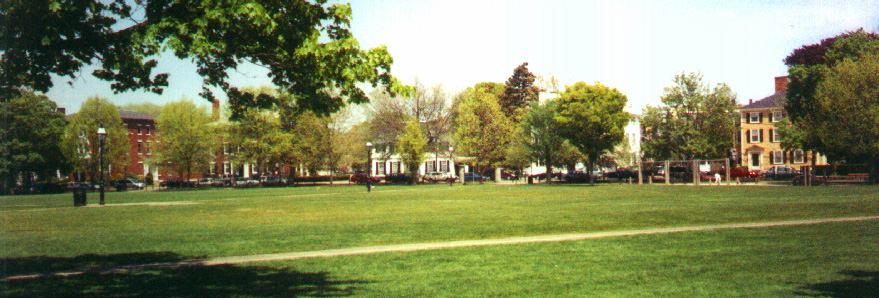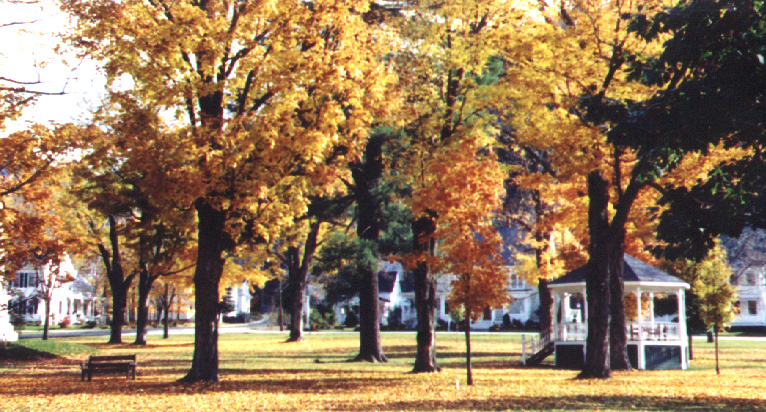

The
Commons 

Literally, any property, usually real estate that is publicly owned–not privately owned.
Example: in Medieval Europe the practice in villages of reserving an area for cattle to graze open to every resident of the village to herd their animals on the grass, or to harvest the lumber of a stand of trees.
Common wells and mills were also a feature of some towns where any resident to acquire water, or bring their grain to grind into flour for bread.
Figuratively, any feature of biological or cultural origins that is used by a sufficient number of people or creatures, that may have such a swift or frequent turnover or be a necessity subject to high demand for its services that no one could possibly own the feature in question.
Examples are water in a stream, the sun's heat on a cold day, the air in a room, or a playground in a public park.
"The Tragedy of the Commons"
An article by the late Garrett Hardin, a human ecologist, who in 1968 published an article in Science magazine in which he argued that certain types of problems have no technical solution. One such problem he sited was the population growth of human families with respect to those resources they all require, but which no one family or person actually owns.
He provocatively argued that "freedom to breed in a commons, brings ruin to all," because the air, water, or other common goods and services we rely on have inherent limitations.
Questions concerning the Tragedy of the Commons
Enclosure movement, occurred in England and other parts of Europe from later Middle Ages, through the Renaissance and into the early modern period. The movement by royal landholders in a region and their subsequent inheritors was to take away the public access to commonly owned village lands. Large landowners did this to secure sufficient pasture for their sheep. As wool became in greater demand to fill the needs of merchants in Flanders, the money to be made raising sheep for the wool trade generated a greater demand for the land needed for sheep to graze. As pressure on land for grazing increased, it is argued that rights granted to villages in the Middle Ages were being canceled or rescinded by petty royalty, churches and other large landowners in England.
The Enclosure Acts were passed in Parliament where bitter debates over public or plebeians (peasant) access to ancestral common lands was being curtailed.
The oldest common in America was established
at Salem by Puritan settlers in  the 17th century as an example of their bringing
European concepts to the New England colonies. The idea was that the villagers shared the grazing land for their common use by letting privately owned livestock thrive on the grasses of the reserved area that all owned together as town members.
the 17th century as an example of their bringing
European concepts to the New England colonies. The idea was that the villagers shared the grazing land for their common use by letting privately owned livestock thrive on the grasses of the reserved area that all owned together as town members.
By tic tac toe, Hardin was referring to the idea yu cannot win some games. Unlike Chess, for example, some other games like tic, tac, toe cannot be won by equally matched opponents. He used tic tac toe as an example of unresolvable problems in his critique of using common property resources without regard to their limitations.
 Vermont town common, centrally located on the Salem model.
Vermont town common, centrally located on the Salem model.
In the space above, set aside as a public park, there is clearly a limit to the number of people, or teams for example that could play soccer or softball, at the same time. There is another limitation of how many people can use the area over and over again without wearing down the grass and requiring that the area be besotted with new grass.
Wilderness recreation can pose a similar physical and a related biological problem for areas reserved for remote outdoor access. How many people can use and area, before it becomes ever less wild?
See: Commonizing costs discussion
Commons related to • protection
Science Index | Analysis | Population Index | Global Warming Index | Nature Index | Research sites.
Obscure | Word index | Terms | Glossary | Word webs | Basic vocabulary | Advanced Vocabulary | Antonyms | Synonyms